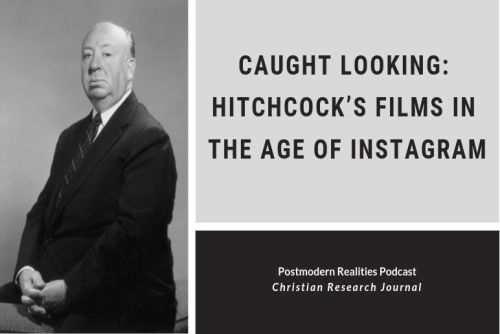“Alfred Hitchcock was one of the most forward-thinking filmmakers of the 20th-century, advancing the art form and anticipating the taste of audiences. Through his most famous films–Psycho, Rear Window, and Vertigo–we find a common theme: anonymous watching. This theme is exponentially more relevant today than in Hitchcock’s own time, living as we do with the power to present our stories and peer into the lives of others. Though Hitchcock’s cinema is often morally askew, gleefully implicating the viewer as just another peeping tom, his work offers a powerful lesson. Art offers us the chance to see ourselves through the screen. It draws us in through the chance to watch unseen, but then reveals to us our own motives. One of the most famous features of Hitchcock’s movies–his cameo–shows us that the director is as aware of the audience as we are of the actors. Though we may think that we are bystanders in media, Hitchcock suggests, we are really participants. Like Norman in Psycho, we think we are anonymous watchers, but Hitchcock’s cinema shows that there is no such thing. Someone is always watching us, if only the creator of the works we consume. Like Jeff in Rear Window, our idle past-time of peeping grows to an obsession that will be found out, but it can offer moments of genuine insight. Like Scottie in Vertigo, however, if we unthinkingly accept the vistas we are offered, vision can easily degrade into delusion. Hitchcock, more than any other modern filmmaker, understood this and helps us to see it as well.”
This Postmodern Realities episode is a conversation with Journal author Philip Tallon about his feature article “Caught Looking: Hitchcock’s Films in the Age of Instagram.”
We’d also like to invite you to subscribe to the Journal. To subscribe to the Journal, please click here.
When you to subscribe to the Journal, you join the team of print subscribers whose paid subscriptions help provide the resources at equip.org that minister to people worldwide. These resources include our free online-exclusive articles, such as this review, as well as our free Postmodern Realities podcast.
Another way you can support keeping our resources free is by leaving us a tip. A tip is just a small amount, like $3 or $5, which is the cost for some of a latte, lunch out, or coffee drink. To leave a tip, click here.
To partner with us and help us to continue to create free online exclusive content, we are offering a special promotion
Other articles and Postmodern Realities podcasts featuring this author
Tolkien Review:
Episode 123 Tolkien’s First Fellowship
Tolkien’s First Fellowship A film review of Tolkien
Steven Spielberg Films
Clear Skies, Hurt Hearts, Can’t Lose: Why Spielberg’s Aliens Help Make us More Human
Episode 139 Clear Skies, Hurt Hearts, Can’t Lose: Why Spielberg’s Aliens Help Make us More Human
The Coen Brother’s Films:
Episode 050: O Father, Where Art Thou? The Coen Brothers and the Riddle of Existence
“O Father, Where Are Thou? The Coen Brothers and the Riddle of Existence
The Films of Quentin Tarantino:
Episode 001: The Films of Quentin Tarantino
“Reservoir Gods: Quentin Tarantino’s Premodern Theology
Other related media articles:
Episode 037: Choose Your Own Enchantment: Freedom and Conscience in What We Watch
Choose Your Own Enchantment: Freedom and Conscience in What We Watch
Film Review: The Church without Claws? A Figurative Reading of the Film Black Panther
Episode 063: Black Panther Film Review with Eric Redmond
Episode 039: The Gospel According to Marvel
The Gospel According to Marvel
Episode 024: Dr. Strange (film review with spoilers)
Episode 067: Spielberg’s Nostalgia for Reality in Ready Player One
Spielberg’s Nostalgia for Reality in Ready Player One.”
Episode 054: The Last Jedi: A Star Wars Movie for the Era of “the Nones”
The Last Jedi: A Star Wars Movie for the Era of “the Nones”
Episode 027: “Evaluating the Star Wars Worldview”
May the Force Bewitch You: Evaluating the Star Wars Worldview
Episode 075: Film Nostalgia & Heaven
Looking for Heaven at the Movies: What our Fondness for Nostalgic Films Says about Us.”
“HBO’s Westworld and the Ethics of Artificial Intelligence.”
Episode 041: The Gracious Heroism of Wonder Woman
The Gracious Heroism of Wonder Woman
Fighting Scientism with the Occult in Doctor Strange
Jesus Films: Who Does Hollywood Say That I Am?
Episode 079: Theology of Morgan Freeman
“The Story of Morgan Freeman (Not God).”
The Artistic Pro-Life Theme in Netflix’s I Am Mother
Postmodern Realities Episode 132: The Artistic Pro-Life Theme in Netflix’s I Am Mother
The Matrix: Unloaded Revelations
Breaking Bad’s Addicting Defense of Moral Realism
Television as the New Literature: Understanding and Evaluating the Medium
A Wrinkle in Time: Drawing Apologetic Value from a De-Christianized Film
Sci-Fi, Free Will, and the Problem of Evil
